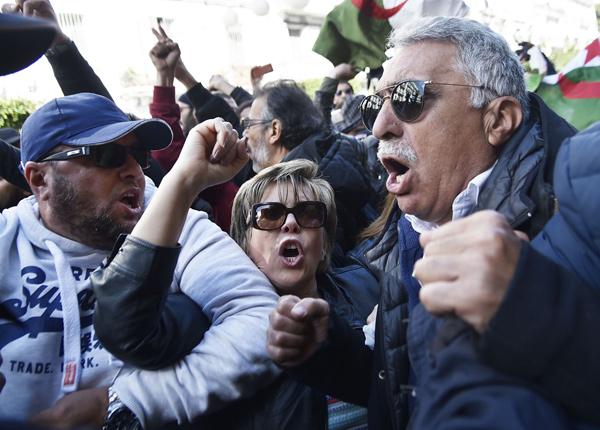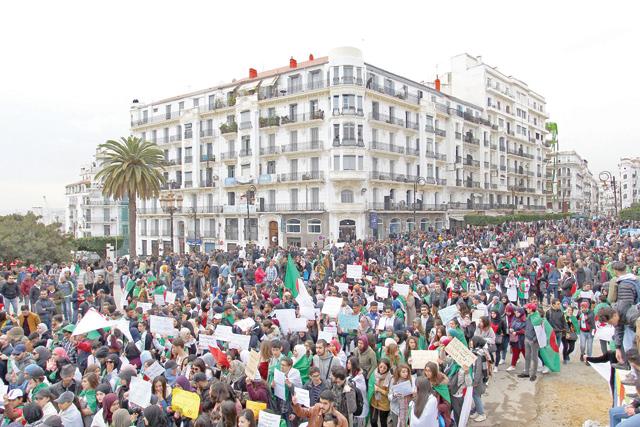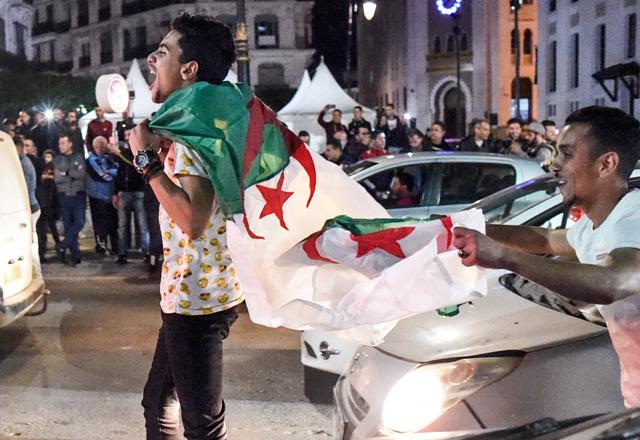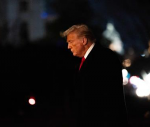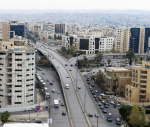You are here
Thousands demonstrate in Algiers as protest leaders tell army to stay away
By Reuters - Mar 19,2019 - Last updated at Mar 19,2019
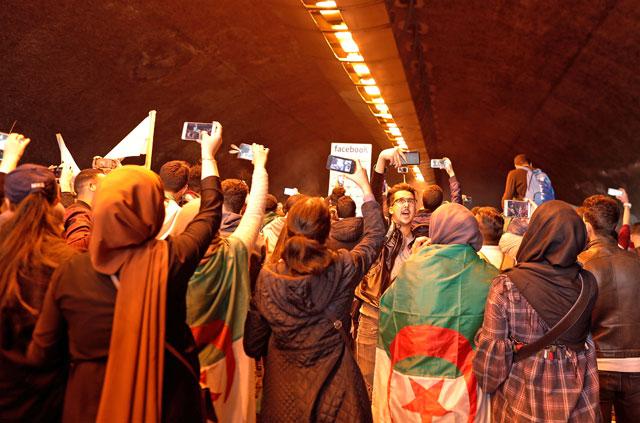
Students use their mobile phones during a protest calling on President Abdelaziz Bouteflika to quit in Algiers, Algeria, on Tuesday (Reuters photo)
ALGIERS — Thousands of students, university professors and health workers rallied in Algiers on Tuesday calling for President Abdelaziz Bouteflika to quit, and a new group headed by activists and opposition figures told the army not to interfere.
In the first direct public message to the generals from leaders emerging from nearly a month of mass protests against Bouteflika, the National Coordination for Change said the military should "play its constitutional role without interfering in the people's choice".
Bouteflika, who has ruled for 20 years, bowed to the protesters last week by announcing he would not stand for another term. But he stopped short of stepping down and said he would stay in office until a new constitution is adopted, effectively extending his present term.
His moves have done nothing to halt demonstrations, which peaked on Friday with hundreds of thousands of protesters on the streets of Algiers and have continued into this week.
"We will not stop our pressure until he [Bouteflika] goes," said student Ali Adjimi, 23. "The people want you to leave", read a banner. Others shouted "the people and the army are one."
The 82-year-old president has rarely been seen in public since suffering a stroke in 2013, and protesters say he is too old and frail to rule.
“We are fed up with this system. It must disappear forever,” said Djilali Bahi, a doctor at Tuesday’s demonstration.
Army ‘responsibility’
So far, soldiers have stayed in their barracks during the protests. But on Monday, Chief of Staff Lt. Gen. Ahmed Gaed Salah hinted at a more active role, saying the army should take responsibility for finding a quick solution to the crisis.
Generals have traditionally wielded power behind the scenes in Algeria but have publicly intervened during pivotal moments, including cancelling an election in the early 1990s that Islamists were poised to win, triggering a decade of civil war.
The protest leaders issued their statement titled “Platform of Change” late on Monday, demanding Bouteflika step down when his term ends on April 28 and the government resign immediately.
“We belong to the people so we are against extending Bouteflika’s fourth term,” said Mohamed Yousfi, head of one of the doctors unions.
Bouteflika’s newly appointed deputy prime minister, Ramtane Lamamra, has launched a tour of allied countries seeking support. He visited Moscow on Tuesday, where Foreign Minister Sergei Lavrov said Russia, a close military ally of Algeria, was concerned about attempts to destabilise the situation.
Lamamra defended the government’s reform proposals. Bouteflika has agreed to hand over power to an elected president, and the opposition will be allowed to take part in the Cabinet that will oversee elections, he said.
Powerful brother
For years, rumours have swirled about potential successors to Bouteflika, but no one credible has emerged who has the backing of the army and elite and is not in their 70s or 80s.
Protesters have been calling for a generation of new leaders to replace a ruling elite dominated by the military, businessmen and veterans of the 1954-1962 independence war against France.
In their statement, the protest leaders made veiled references to two figures: Bouteflika’s powerful younger brother Said, and the president’s friend Lakhdar Brahimi, a veteran Algerian UN diplomat named by Bouteflika to chair a conference to develop a new political landscape.
“The Algerian people will not accept any approach that will tend to extend the current system, whether from the ‘brother’ entourage or the ‘friend’,” the protest leaders said.
Algerian authorities have long been adept at manipulating a weak and disorganised opposition. But the mass demonstrations have emboldened well-known figures to lead the reform drive.
Prominent members of the new group include lawyer and activist Mustapha Bouchachi, opposition leader Karim Tabou and former treasury minister Ali Benouari.
They also include Mourad Dhina and Kamel Guemazi, former members of the banned Islamic Salvation Front, the Islamist party whose annulled election victory led to the 1990s insurgency. A possible role for Islamists in any future government is one of the issues that could divide the public and potentially provoke the military to intervene.
Hardline Islamists have largely been excluded from public life since the war. More moderate Islamist groups are active but ideologically divided.
Zoubida Assoul, leader of a small political party, is the only woman in the group so far.
“Bouteflika just trampled on the constitution after he decided to extend his fourth term,” said the National Coordination for Change.
With memories of the 1990s civil war which cost an estimated 200,000 lives, many Algerians have long prioritised stability.
Bouteflika survived the 2011 “Arab Spring” that toppled other Arab leaders. But with the economy souring and the youth less fearful of change, he has struggled to placate Algerians.
Related Articles
ALGIERS — Algerian police fired tear gas to disperse hundreds of demonstrators on a third straight day of rare political protests again
ALGIERS — Algeria's army chief said the public had expressed "noble aims" during protests against President Abdelaziz Bouteflika and the rul
ALGIERS — Algerians took to the streets in celebration on Monday evening after ailing President Abdelaziz Bouteflika announced that he had a


